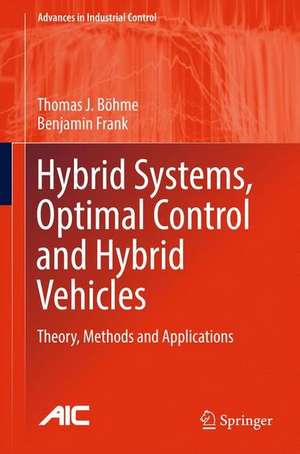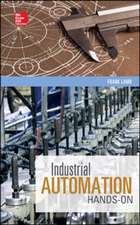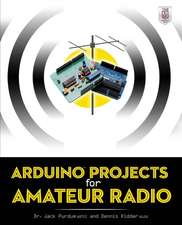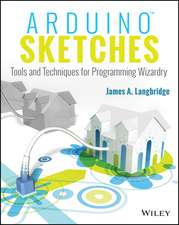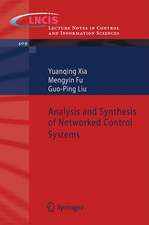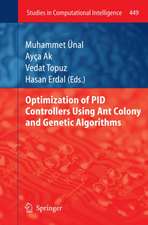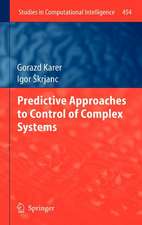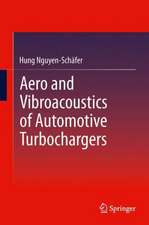Hybrid Systems, Optimal Control and Hybrid Vehicles: Theory, Methods and Applications: Advances in Industrial Control
Autor Thomas J. Böhme, Benjamin Franken Limba Engleză Hardback – 10 feb 2017
Hybrid Systems, Optimal Control and Hybrid Vehicles shows the reader how to formulate and solve control problems which satisfy multiple objectives which may be arbitrary and complex with contradictory influences on fuel consumption, emissions and drivability. The text introduces industrial engineers, postgraduates and researchers to the theory of hybrid optimal control problems. A series of novel algorithmic developments provides tools for solving engineering problems of growing complexity in the field of hybrid vehicles.
Important topics of real relevance rarely found in text books and research publications—switching costs, sensitivity of discrete decisions and there impact on fuel savings, etc.—are discussed and supported with practical applications. These demonstrate the contribution of optimal hybrid control in predictive energy management, advanced powertrain calibration, and the optimization of vehicle configuration with respect to fuel economy, lowest emissions and smoothest drivability. Numerical issues such as computing resources, simplifications and stability are treated to enable readers to assess such complex systems. To help industrial engineers and managers with project decision-making, solutions for many important problems in hybrid vehicle control are provided in terms of requirements, benefits and risks.
| Toate formatele și edițiile | Preț | Express |
|---|---|---|
| Paperback (1) | 702.88 lei 38-44 zile | |
| Springer International Publishing – 13 iul 2018 | 702.88 lei 38-44 zile | |
| Hardback (1) | 924.54 lei 38-44 zile | |
| Springer International Publishing – 10 feb 2017 | 924.54 lei 38-44 zile |
Din seria Advances in Industrial Control
- 15%
 Preț: 643.34 lei
Preț: 643.34 lei - 23%
 Preț: 582.63 lei
Preț: 582.63 lei - 18%
 Preț: 783.98 lei
Preț: 783.98 lei - 18%
 Preț: 947.35 lei
Preț: 947.35 lei - 20%
 Preț: 568.24 lei
Preț: 568.24 lei - 15%
 Preț: 643.16 lei
Preț: 643.16 lei - 18%
 Preț: 899.21 lei
Preț: 899.21 lei - 18%
 Preț: 891.33 lei
Preț: 891.33 lei - 18%
 Preț: 740.57 lei
Preț: 740.57 lei - 18%
 Preț: 961.23 lei
Preț: 961.23 lei - 18%
 Preț: 955.08 lei
Preț: 955.08 lei - 15%
 Preț: 645.28 lei
Preț: 645.28 lei - 15%
 Preț: 638.43 lei
Preț: 638.43 lei - 18%
 Preț: 901.11 lei
Preț: 901.11 lei - 18%
 Preț: 1410.94 lei
Preț: 1410.94 lei - 18%
 Preț: 728.91 lei
Preț: 728.91 lei - 20%
 Preț: 1003.77 lei
Preț: 1003.77 lei - 18%
 Preț: 947.35 lei
Preț: 947.35 lei - 15%
 Preț: 643.34 lei
Preț: 643.34 lei - 15%
 Preț: 654.30 lei
Preț: 654.30 lei - 18%
 Preț: 950.52 lei
Preț: 950.52 lei - 15%
 Preț: 644.30 lei
Preț: 644.30 lei - 18%
 Preț: 1393.09 lei
Preț: 1393.09 lei - 18%
 Preț: 950.21 lei
Preț: 950.21 lei - 18%
 Preț: 949.90 lei
Preț: 949.90 lei - 18%
 Preț: 949.42 lei
Preț: 949.42 lei - 18%
 Preț: 950.52 lei
Preț: 950.52 lei - 18%
 Preț: 1113.71 lei
Preț: 1113.71 lei - 15%
 Preț: 650.04 lei
Preț: 650.04 lei - 15%
 Preț: 644.95 lei
Preț: 644.95 lei - 18%
 Preț: 950.33 lei
Preț: 950.33 lei - 18%
 Preț: 948.61 lei
Preț: 948.61 lei - 18%
 Preț: 1112.60 lei
Preț: 1112.60 lei - 15%
 Preț: 644.63 lei
Preț: 644.63 lei - 18%
 Preț: 953.20 lei
Preț: 953.20 lei - 18%
 Preț: 945.62 lei
Preț: 945.62 lei - 15%
 Preț: 640.88 lei
Preț: 640.88 lei - 15%
 Preț: 640.88 lei
Preț: 640.88 lei - 20%
 Preț: 650.92 lei
Preț: 650.92 lei - 18%
 Preț: 1112.60 lei
Preț: 1112.60 lei - 20%
 Preț: 998.36 lei
Preț: 998.36 lei - 15%
 Preț: 643.34 lei
Preț: 643.34 lei - 18%
 Preț: 948.92 lei
Preț: 948.92 lei - 18%
 Preț: 1381.43 lei
Preț: 1381.43 lei - 15%
 Preț: 651.51 lei
Preț: 651.51 lei - 15%
 Preț: 647.08 lei
Preț: 647.08 lei - 20%
 Preț: 563.66 lei
Preț: 563.66 lei - 18%
 Preț: 998.03 lei
Preț: 998.03 lei - 18%
 Preț: 1225.79 lei
Preț: 1225.79 lei
Preț: 924.54 lei
Preț vechi: 1216.50 lei
-24% Nou
Puncte Express: 1387
Preț estimativ în valută:
176.93€ • 182.78$ • 147.25£
176.93€ • 182.78$ • 147.25£
Carte tipărită la comandă
Livrare economică 22-28 martie
Preluare comenzi: 021 569.72.76
Specificații
ISBN-13: 9783319513157
ISBN-10: 331951315X
Pagini: 530
Ilustrații: XXXIII, 530 p. 143 illus., 113 illus. in color.
Dimensiuni: 155 x 235 x 33 mm
Greutate: 0.23 kg
Ediția:1st ed. 2017
Editura: Springer International Publishing
Colecția Springer
Seria Advances in Industrial Control
Locul publicării:Cham, Switzerland
ISBN-10: 331951315X
Pagini: 530
Ilustrații: XXXIII, 530 p. 143 illus., 113 illus. in color.
Dimensiuni: 155 x 235 x 33 mm
Greutate: 0.23 kg
Ediția:1st ed. 2017
Editura: Springer International Publishing
Colecția Springer
Seria Advances in Industrial Control
Locul publicării:Cham, Switzerland
Cuprins
Part I Introduction.- Introduction.- Modeling of Hybrid Vehicles as Cyber-physical Systems.- Optimal Control Preliminaries.- Problem Formulation.- Part II Numerical Solutions.- Optimal Control Solutions Using Indirect Methods.- Optimal Control Solutions Using Direct Methods.- Numerical Algorithms.- Part III Applications.- Advanced Applications.- Predictive Real-time Energy Management.- CO2 Management.
Notă biografică
Dr. Thomas Böhme is currently working as a technical consultant at the iav automotive engineering company. He has over 15 years industrial experience in modeling and control of chemical processes and embedded systems. His research interests are vehicle control and optimal control of hybrid systems. He published over 30 peer-reviewed papers, journal contributions and patents.
Benjamin Frank is mathematician and working at the iav automotive engineering company. He published several papers and contributions in the field of control and optimizations.
Benjamin Frank is mathematician and working at the iav automotive engineering company. He published several papers and contributions in the field of control and optimizations.
Textul de pe ultima copertă
This book assembles new methods showing the automotive engineer for the first time how hybrid vehicle configurations can be modeled as systems with discrete and continuous controls. These hybrid systems describe naturally and compactly the networks of embedded systems which use elements such as integrators, hysteresis, state-machines and logical rules to describe the evolution of continuous and discrete dynamics and arise inevitably when modeling hybrid electric vehicles. They can throw light on systems which may otherwise be too complex or recondite.
Hybrid Systems, Optimal Control and Hybrid Vehicles shows the reader how to formulate and solve control problems which satisfy multiple objectives which may be arbitrary and complex with contradictory influences on fuel consumption, emissions and drivability. The text introduces industrial engineers, postgraduates and researchers to the theory of hybrid optimal control problems. A series of novel algorithmic developments provides tools for solving engineering problems of growing complexity in the field of hybrid vehicles.
Important topics of real relevance rarely found in text books and research publications—switching costs, sensitivity of discrete decisions and there impact on fuel savings, etc.—are discussed and supported with practical applications. These demonstrate the contribution of optimal hybrid control in predictive energy management, advanced powertrain calibration, and the optimization of vehicle configuration with respect to fuel economy, lowest emissions and smoothest drivability. Numerical issues such as computing resources, simplifications and stability are treated to enable readers to assess such complex systems. To help industrial engineers and managers with project decision-making, solutions for many important problems in hybrid vehicle control are provided in terms of requirements, benefits and risks.
Hybrid Systems, Optimal Control and Hybrid Vehicles shows the reader how to formulate and solve control problems which satisfy multiple objectives which may be arbitrary and complex with contradictory influences on fuel consumption, emissions and drivability. The text introduces industrial engineers, postgraduates and researchers to the theory of hybrid optimal control problems. A series of novel algorithmic developments provides tools for solving engineering problems of growing complexity in the field of hybrid vehicles.
Important topics of real relevance rarely found in text books and research publications—switching costs, sensitivity of discrete decisions and there impact on fuel savings, etc.—are discussed and supported with practical applications. These demonstrate the contribution of optimal hybrid control in predictive energy management, advanced powertrain calibration, and the optimization of vehicle configuration with respect to fuel economy, lowest emissions and smoothest drivability. Numerical issues such as computing resources, simplifications and stability are treated to enable readers to assess such complex systems. To help industrial engineers and managers with project decision-making, solutions for many important problems in hybrid vehicle control are provided in terms of requirements, benefits and risks.
Advances in Industrial Control aims to report and encourage thetransfer of technology in control engineering. The rapid development of control technology has an impact on all areas of the control discipline. The series offers an opportunity for researchers to present an extended exposition of new work in all aspects of industrial control.
Caracteristici
Enhances the depth of system models for hybrid vehicles and renders them feasible for practitioners using novel hybrid control methods Demonstrates that optimal control of hybrid systems are unbeatable when applied to currently key-areas in fuel and emission control of hybrid electric vehicles Gives the automotive practitioner a systematic insight into the modeling and analysis of complex vehicle configurations consisting of physical processes, software artifacts and network communication Facilitates the in-project engineering and management decision-making process of a project by providing solutions in terms of requirements, benefits and risks Includes supplementary material: sn.pub/extras
